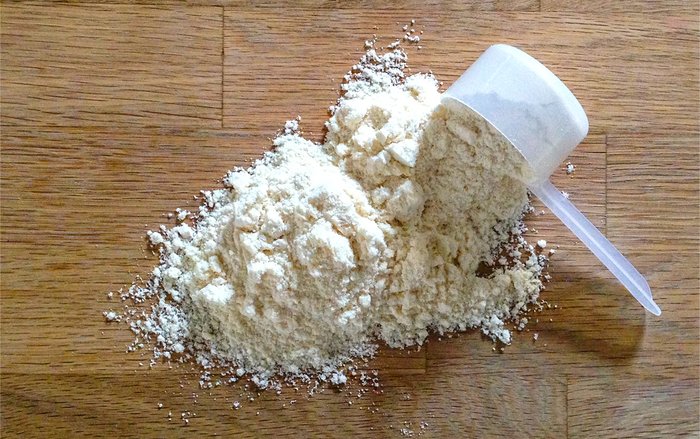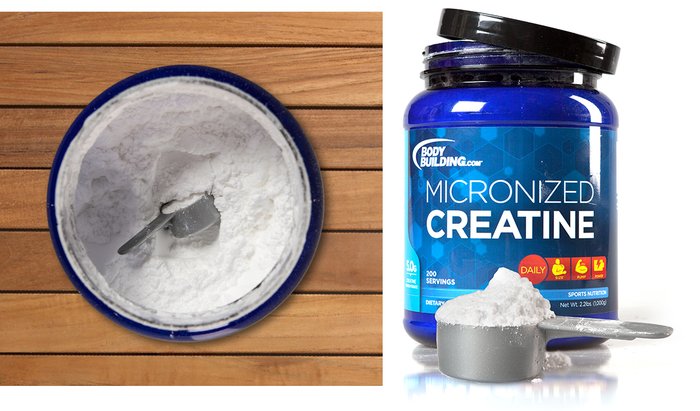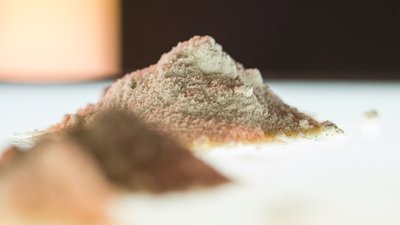It's no secret that eating enough protein is crucial to building muscle, but if a diet lacks major protein sources, higher priority must be placed on finding the right sources—and plenty of them! Vegetarians, particularly vegetarian athletes, know this all too well. For example, a vegetarian diet is almost devoid of creatine and beta-alanine, which are supplement staples for many athletes.
And therein lies the good news: Vegetarian athletes can use supplements to make up for shortcomings in their diet. Here are our top choices!
1. Vegetarian Protein Powder
When following a vegetarian diet, eating enough protein throughout the day can prove to be tough if you're not strategic and prepared. And since most plant proteins, other than soy and quinoa, don't contain all nine essential amino acids, your options dwindle.

Try a soy protein or vegetarian protein powder blend for a convenient, complete vegetarian protein that will work with your muscle-building efforts.
Of course, you can always pair incomplete proteins, such as rice and beans, to form a complementary protein, but even this may feel tough at times, especially when you're looking for a convenient protein source on the run.
Try a soy protein or vegetarian protein powder blend for a convenient, complete vegetarian protein that will work with your muscle-building efforts. Of course, if you eat dairy, a whey-based protein powder works well, too.
2. Branched-Chain Amino Acids
Branched-chain amino acids (BCAAs) constitute three of the essential amino acids. Uniquely, however, they bypass the liver and head straight to the muscles once consumed.
This is beneficial for several reasons. First, BCAAs are the primary amino acids broken down during exercise, so replenishing them helps to preserve and bolster muscle mass. Second, leucine in particular has been shown to directly instigate muscle building. Since many plant proteins are lacking in BCAAs, supplementation can prove to be invaluable to support your hard training. What's more, supplementation during training has been shown to decrease fatigue and spare muscle glycogen, allowing you to crush your performance![1-3]
3. Creatine
Creatine is found in animal meats, which is something a vegetarian diet lacks. Although your body is able to produce creatine, there's strong evidence that vegetarians are significantly lacking in creatine stores.[4]

Creatine is found exclusively in animal meats. Vegetarians are more likely to have low creatine stores, thus, they will benefit from creatine supplementation.
This extensively studied supplement has been shown to positively affect strength, muscle mass, and body composition.[5] Consider supplementing with 5 grams per day to elevate your performance.
4. Beta-Alanine
Beta-alanine is also found in animal meats, so it's hard to come by on a vegetarian diet. Beta-alanine has been shown to enhance anaerobic exercise on its own, but it provides further benefit when taken with creatine.[6] Skimping on these two supplements may be the reason you're spinning your wheels in the gym—and we don't mean during a long bike ride!
To put your beta-alanine to good use, aim for 3-6 grams per day, split evenly over 2-4 doses. It takes time to build up your body's stores, so it will also take time to experience the beneficial effects of beta-alanine. You may feel a tingling sensation upon taking it. Don't worry; that's normal and not harmful.
References
- Shimomura, Y., Murakami, T., Nakai, N., Nagasaki, M., & Harris, R. A. (2004). Exercise promotes BCAA catabolism: effects of BCAA supplementation on skeletal muscle during exercise. The Journal of Nutrition, 134(6), 1583S-1587S.
- Newsholme, E. A., Acworth, I. N., & Blomstrand, E. (1987). Amino acids, brain neurotransmitters and a functional link between muscle and brain that is important in sustained exercise. Advances in Myochemistry, 1, 127-133.
- Gualano, A. B., Bozza, T., De Campos, P. L., Roschel, H., Costa, A. D. S., Marquezi, M. L., ... & Junior, A. H. L. (2011). Branched-chain amino acids supplementation enhances exercise capacity and lipid oxidation during endurance exercise after muscle glycogen depletion. The Journal of Sports Medicine and Physical Fitness, 51(1), 82-8.
- Delanghe, J., De Slypere, J. P., De Buyzere, M., Robbrecht, J., Wieme, R., & Vermeulen, A. (1989). Normal reference values for creatine, creatinine, and carnitine are lower in vegetarians. Clinical Chemistry, 35(8), 1802-1803.
- Kreider, R. B., Ferreira, M., Wilson, M., Grindstaff, P., Plisk, S., Reinardy, J., ... & Almada, A. L. (1998). Effects of creatine supplementation on body composition, strength, and sprint performance., 73-82.
- Hoffman, J. R., Ratamess, N. A., Kang, J., Mangine, G., Faigenbaum, A., & Stout, J. (2006). Effect of creatine and beta-alanine supplementation on performance and endocrine responses in strength/power athletes. International Journal of Sport Nutrition and Exercise Metabolism, 16, 430-446.

